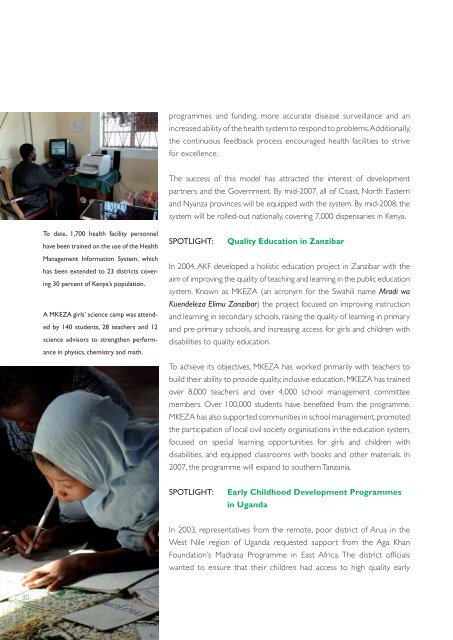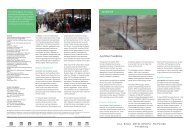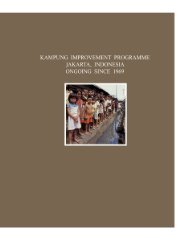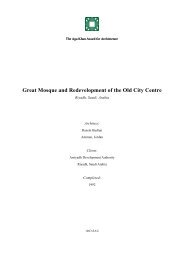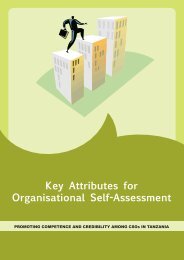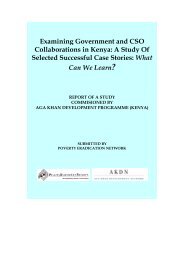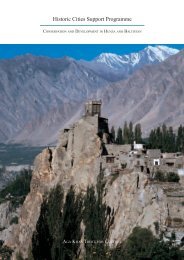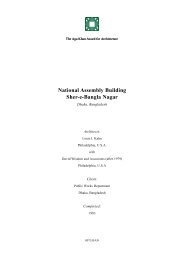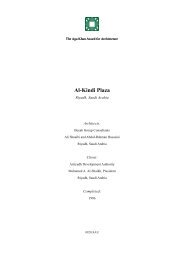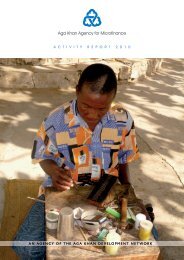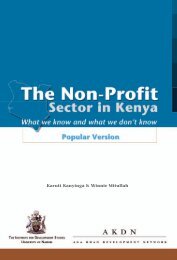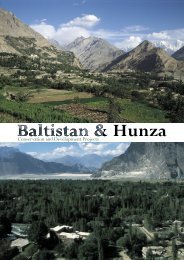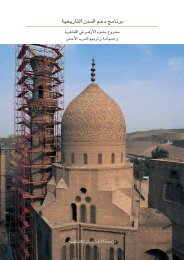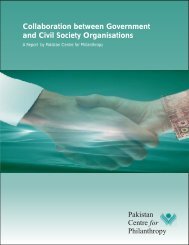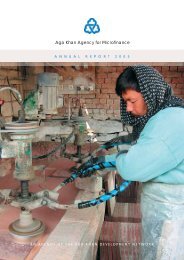AKF Annual Report - Aga Khan Development Network
AKF Annual Report - Aga Khan Development Network
AKF Annual Report - Aga Khan Development Network
Create successful ePaper yourself
Turn your PDF publications into a flip-book with our unique Google optimized e-Paper software.
programmes and funding, more accurate disease surveillance and an<br />
increased ability of the health system to respond to problems. Additionally,<br />
the continuous feedback process encouraged health facilities to strive<br />
for excellence.<br />
The success of this model has attracted the interest of development<br />
partners and the Government. By mid-2007, all of Coast, North Eastern<br />
and Nyanza provinces will be equipped with the system. By mid-2008, the<br />
system will be rolled-out nationally, covering 7,000 dispensaries in Kenya.<br />
To date, 1,700 health facility personnel<br />
have been trained on the use of the Health<br />
Management Information System, which<br />
has been extended to 23 districts covering<br />
30 percent of Kenya’s population.<br />
A MKEZA girls’ science camp was attended<br />
by 140 students, 28 teachers and 12<br />
science advisors to strengthen performance<br />
in physics, chemistry and math.<br />
SPOTLIGHT: Quality Education in Zanzibar<br />
In 2004, <strong>AKF</strong> developed a holistic education project in Zanzibar with the<br />
aim of improving the quality of teaching and learning in the public education<br />
system. Known as MKEZA (an acronym for the Swahili name Mradi wa<br />
Kuendeleza Elimu Zanzibar) the project focused on improving instruction<br />
and learning in secondary schools, raising the quality of learning in primary<br />
and pre-primary schools, and increasing access for girls and children with<br />
disabilities to quality education.<br />
To achieve its objectives, MKEZA has worked primarily with teachers to<br />
build their ability to provide quality, inclusive education. MKEZA has trained<br />
over 8,000 teachers and over 4,000 school management committee<br />
members. Over 100,000 students have benefited from the programme.<br />
MKEZA has also supported communities in school management, promoted<br />
the participation of local civil society organisations in the education system,<br />
focused on special learning opportunities for girls and children with<br />
disabilities, and equipped classrooms with books and other materials. In<br />
2007, the programme will expand to southern Tanzania.<br />
SPOTLIGHT:<br />
Early Childhood <strong>Development</strong> Programmes<br />
in Uganda<br />
In 2003, representatives from the remote, poor district of Arua in the<br />
West Nile region of Uganda requested support from the <strong>Aga</strong> <strong>Khan</strong><br />
Foundation’s Madrasa Programme in East Africa. The district officials<br />
wanted to ensure that their children had access to high quality early<br />
30


